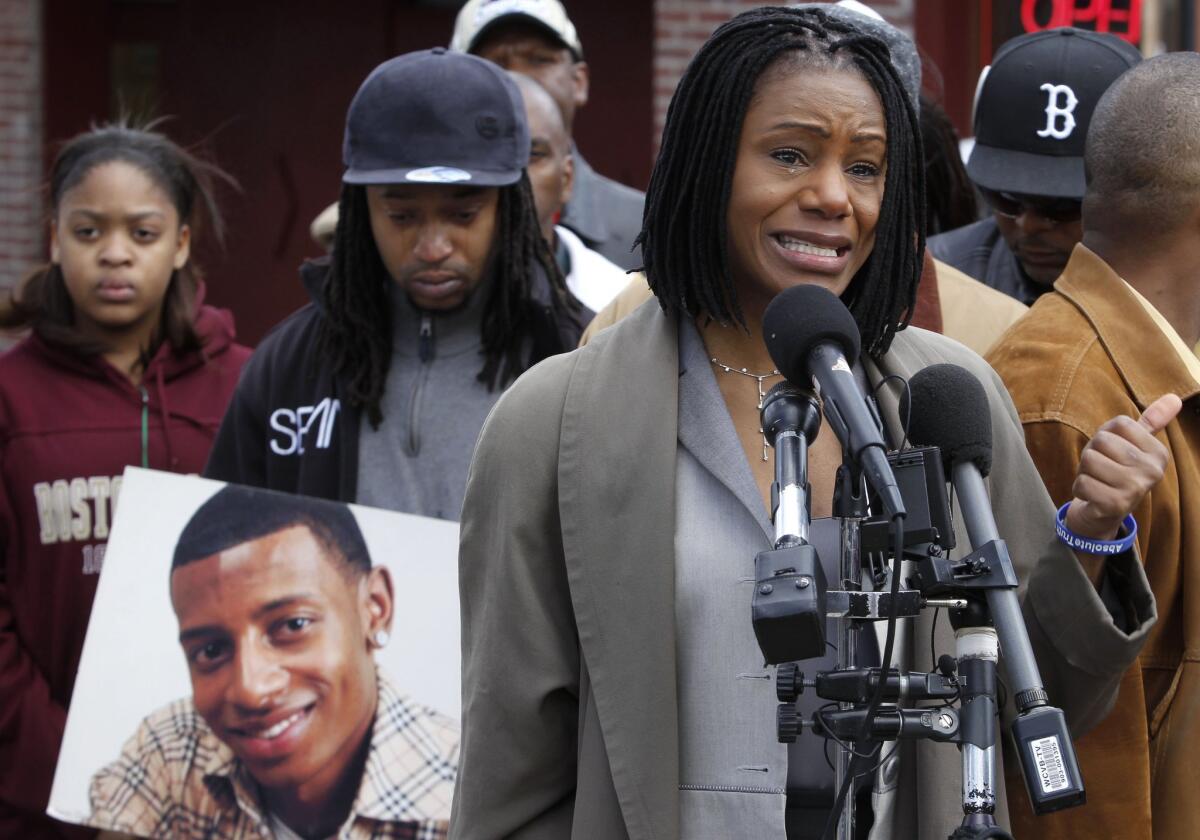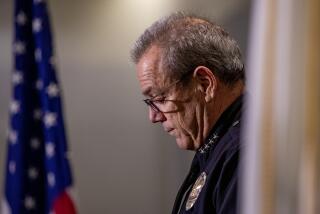No civil rights charges in fatal shooting by police in Pleasantville, N.Y.

Thulani DeMarsay, aunt of police shooting victim Danroy Henry Jr., at a 2011 news conference.
- Share via
Reporting from New York — Federal prosecutors say there was not enough evidence to bring charges against a police officer who shot to death an unarmed black college student north of New York City in a case that sparked allegations of abuse of power and racial profiling.
Danroy Henry Jr. was a 20-year-old student at Pace University in Pleasantville, N.Y., when he was killed in October 2010. Police encountered him as they arrived outside a bar where a rowdy crowd had gathered after a college football game.
Prosecutors said Henry was not involved in the altercation that broke out around 1 a.m. among bar patrons and led the owner of the night spot to call police. Officers from both Mount Pleasant and the Pleasantville police departments arrived at the scene, where Henry was in the driver’s seat of his car waiting for some friends.
According to a statement released Tuesday night by the U.S. attorney in Manhattan, Preet Bharara, Henry drove forward as police knocked on his car window and told him to stop.
One officer who stepped in front of Henry’s car was hit.
“Although there are inconsistencies in the witness accounts regarding the chronology of certain subsequent events, the weight of the evidence indicates that Mr. Henry’s car was braking when it hit the Pleasantville police officer,” the prosecutor’s report said.
The officer ended up on the hood of Henry’s car and opened fire, killing Henry and wounding a passenger. Henry had a blood-alcohol level of .13 when he died, according to a toxicology report.
Bharara cited several reasons for not pursuing federal charges and noted that prosecutors in cases alleging civil rights violations must prove that police “willfully deprived an individual of a constitutional right.”
“This is one of the highest standards of intent imposed by law,” said Bharara.
The decision comes amid a heightened national debate over law enforcement treatment of black men following several high-profile cases involving unarmed blacks dying at the hands of police.
Hours before Bharara’s decision was announced, a white South Carolina police officer was charged with murder in the shooting death of an unarmed black man after police obtained a video that showed him unleash a volley of gunfire while the man ran away.
Last month, federal prosecutors said they did not have sufficient evidence to bring civil rights charges against a white Ferguson, Mo., police officer in who in August 2014 shot to death Michael Brown, an unarmed black 18-year-old. A grand jury also declined to charge Wilson with homicide in that case.
In New York in December, a Staten Island grand jury declined to prosecute a white officer involved in an altercation with an unarmed black man named Eric Garner, who was put in an apparent chokehold and died.
Four months after Henry died, a Westchester County declined to bring charges against police involved in the shooting. Henry’s father, Danroy Henry Sr., called his son’s shooting murder.
“We may never know why, but we need people to understand what happened, because what happened was murder,” he said after the grand jury’s decision.
In comments posted on Twitter after Bharara’s decision was announced, Henry said: “Our family always recognized that we could never be victorious regardless of the outcome of the civil rights review. DJ won’t return home.”
Henry also Tweeted: “Murder is murder! Intent to us is clear.”
In his statement, Bharara expressed “deep sympathy to the family of Mr. Henry for their tragic loss.”
In detailing his reasons for closing the case without bringing charges, Bharara said the shooting happened “within a matter of seconds, without any prior interaction or relationship between the Pleasantville officer and Mr. Henry that could lead a reasonable juror to believe that the officer had a motive to violate Mr. Henry’s civil rights.”
In addition, the U.S. attorney said a “reasonable person” would likely conclude that the officer had fired his weapon after being hit by the car and that he was “positioned hazardously on the hood of a moving vehicle, requiring him to make a split-second decision under conditions of extreme danger, conditions under which the law generally allows latitude to a police officer’s judgment.”
Finally, Bharara said there was not enough consistent, credible witness testimony to prove that the officer had intended to deprive Henry of his constitutional rights. Bharara also noted that it would have been too dark for the officer to determine Henry’s race, making allegations of racial profiling unlikely to hold up in court.
The statement cited the same reasons for not bringing charges against police in connection with the injuries suffered by Henry’s passenger, Brandon Cox.
Follow @TinaSusman for national news
More to Read
Sign up for Essential California
The most important California stories and recommendations in your inbox every morning.
You may occasionally receive promotional content from the Los Angeles Times.














